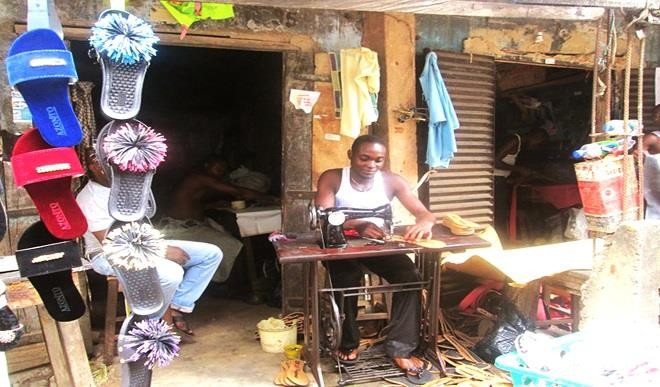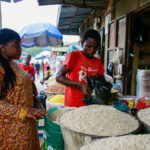
Some of the reasons for which the Central Bank of Nigeria (CBN) last year banned commercial banks from issuing dollar for the importation of selected products were to develop the local manufacturing sector, increase patronage of homemade goods and reduce pressure on the naira.
As the pressure on the naira continued to mount over the country’s excessive import bills and low forex receipts from exports, the federal government intensified efforts to encourage Nigerians to buy locally made goods.
Individuals, organisations and politicians including Senator Ben Murray Bruce and Senator Enyinnaya Abaribe, stepped up the campaign on social media and exhibitions.
However, it appears there has to be a national re-branding campaign to change the taste of Nigerians in favour of homemade products as against their present craze for imported goods.
A look at some of Nigeria’s economic indicators shows that there is a cause to worry and an urgent need to address issues affecting patronage of homemade goods.
Relevant data from the National Bureau of Statistics (NBS) and some international rating agencies show that consumer confidence, business confidence, competiveness and corruption ratings remain worrisome and affect image of Made-in-Nigeria goods.
Consumer confidence in Nigeria as at the last quarter of 2015 dropped to -3 from -1.9 recorded the previous quarter while business confidence stood at 8.3 per cent as at the end of last year, down by 6.6 per cent from 14.9 per cent recorded at the third quarter of 2015.
On competiveness and corruption rankings, locally produced goods continue to attract negative attention.
As at December last year, Nigeria was occupying the ranks of 124 and 136 on competitiveness and corruption indexes from 127 and 170 positions occupied the previous year.
In terms of competitiveness, the cost of manufacturing products in Nigeria is high and this results in high cost of finished goods when compared to goods produced in countries with better ranking on Ease of Doing Business Index.
Nigeria is currently occupying the 169th position on the Ease of Doing Business Index out of 189 economies.
Recently, the former Director of World Bank, African Region, Oby Ezekwesili, lamented that the country must address high cost of doing business if companies must compete favourably.
Speaking at the 2016 Abuja Chamber of Commerce and Industry (ACCI) Excellence Award Dinner held in Abuja, Ezekwesili said if the cost of doing business remained high in any city, businesses in the city would not be able to compete in terms of price with those outside that city.
This explains why some entrepreneurs would rather import textiles and garments at cheaper rates from China rather than produce them in Kaduna due to high production cost.
During a recent visit to Media Trust Headquarters in Abuja, the president of the Kaduna Chamber of Commerce, Industry, Mines and Agriculture (KADCCIMA), Dr. Abdul Alimi Bello, said high cost of production killed Kaduna textile industry.
Bello said consumers wanted to patronise cheap textiles and so importers flooded the markets with cheaper textiles that were imported than locally produced products, leading to the demise of the textile industry in the state.
“What actually brought about the collapse of textile industries in Kaduna? One, there is this issue of stiff completion against imported textile materials. Here you are, you produce your own textile material at N10,000 and somebody is bringing it to your shore at N2,000, N3,000,” he said.
Corruption and quality compromise to make high profits are part of the reasons consumers advance for their preference for imported goods to homemade ones.
An economist and consultant, Babajide Olu, cited an example with steel which was included among items banned from accessing forex, in order to encourage it’s local production.
Olu told Daily Trust on Sunday that within this short period of the ban, Nigeria has become self sufficient in steel production, but added that some manufacturers have started compromising on quality.
This means that buyers may continue to patronise imported steel instead of locally produced ones due to quality consideration.
Still on quality of locally made goods, the Kaduna State Coordinator of the Standards Organisation of Nigeria (SON), Alhaji Abba Bauchi, recently announced that 477 companies out of the 561 companies inspected in the state failed the routine certification of the organisation.
Bauchi disclosed that only 84 of the companies met the criteria for quality certification and this data paints a picture of how serious companies operating in Nigeria take issues of quality of products they produce.
Also speaking recently in Abuja, the Permanent Secretary in the Ministry of Industry, Trade and Investment, Aliyu Aminu Bisalla, said people want value for their money and that, that was one of the reasons Nigerians resist substandard products produced locally.
Bisalla argued that Nigeria has what it takes to produce unique goods that can compete all over the world.
He cited an instance where electric cables that are Nigerian made are patronised than imported ones and foreign consumers are now coming to the country to purchase the cables.
The acting Director General of the SON, Dr Paul Angy, on his part, noted that many of the imported goods, which Nigerians prefer are actually inferior to locally produced items.
He maintained that imported goods were more likely to be adulterated than locally manufactured goods as the organisation monitors the production processes of local industries to ensure quality and standards are maintained.
As an incentive for the development of homemade products, imports must be checked as Nigeria’s huge import bills are killing local industries.
The Foreign Trade Statistics released by the National Bureau of Statistics (NBS) from the fourth quarter of 2014 to the third quarter of last year, revealed that Nigeria spent a total of $34.84 billion (N6.94 trillion) on import bills.
The total amount spent on imports within the one year was in excess of the N6.04trillion proposed by President Muhammadu Buhari for this year’s budget, and over N2trillion above the total amount appropriated for the 2015 budget.
Apart from the quality of goods, the next major hurdle on the way of Made-in-Nigeria goods, is the negative perception of Nigerians.
The Minister of State for Industry, Trade and Investment, Aisha Abubakar, while receiving officers of ‘BuyNaija’ Initiative in her office recently, said the government was working towards promoting positive brands of the country to increase patronage.
“We have to get our branding right so that when we wear something, we would know it is a Nigerian product we are wearing. The ministry would have a date for wearing made-in-Nigeria; we will speak with the president to schedule a day for wearing made-in-Nigeria,” she said.
The Director of BuyNaija initiative, Mr. William Iheanacho Otabil, made a case for a paradigm shift in Nigerian manufacturing industry and as well change attitude of Nigerians towards products that are locally made.
Lamenting low patronage of locally manufactured military wears and textile materials, Mr. Otabil argued that “all our textile materials are not fake.”
He expressed disappointment that there are no locally manufactured military wears in Nigerian markets.
Otabil said with his BuyNija Initiative Campaign, the challenges facing Nigerian manufacturers will soon become a thing of the past. It should be noted that for the campaign for Made-in Nigeria goods to make impact, all stakeholders must key into the programme.

 Join Daily Trust WhatsApp Community For Quick Access To News and Happenings Around You.
Join Daily Trust WhatsApp Community For Quick Access To News and Happenings Around You.



